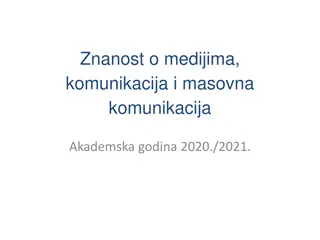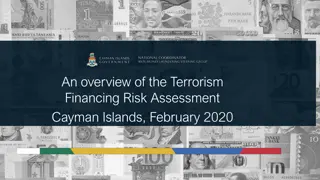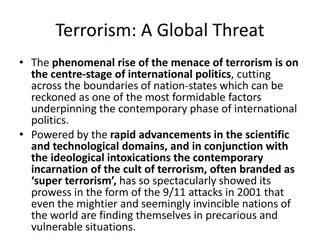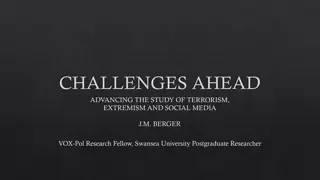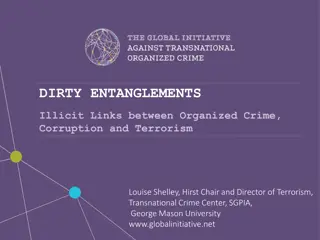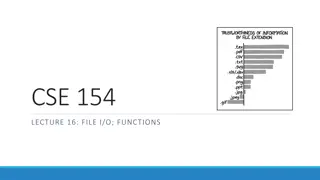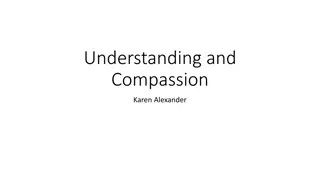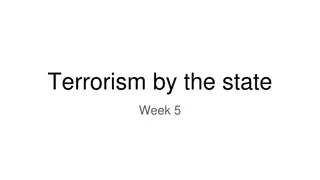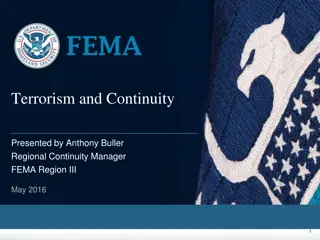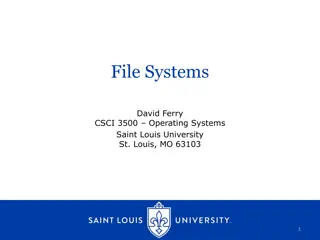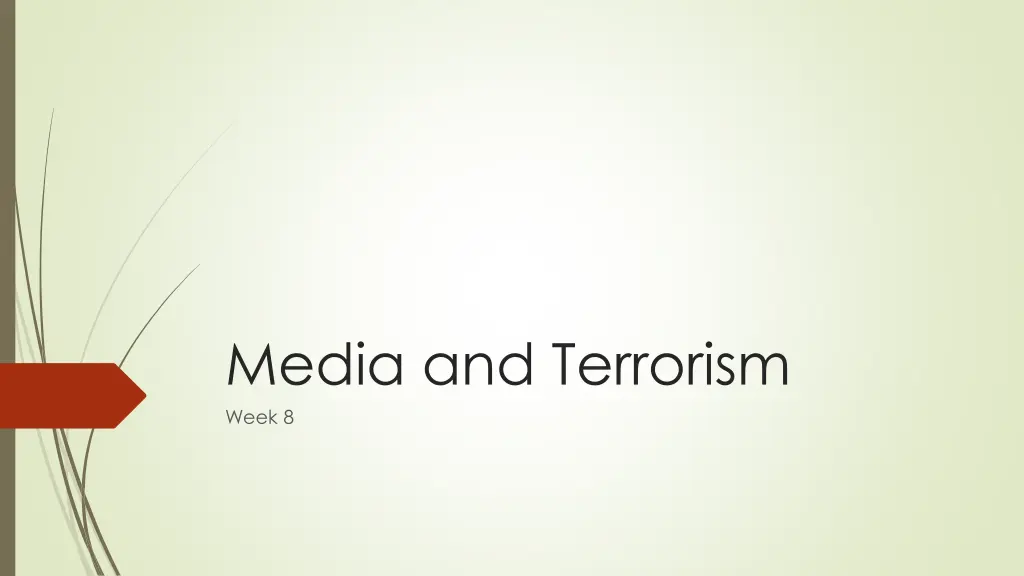
Understanding the Role of Media in Terrorism: Goals and Impacts
Explore the centrality of media in terrorism and the goals of terrorists, governments, and the media in relation to publicity, legitimacy, and security. Learn about the complex dynamics between the media, law enforcement, and the public in the context of terrorist events.
Uploaded on | 0 Views
Download Presentation

Please find below an Image/Link to download the presentation.
The content on the website is provided AS IS for your information and personal use only. It may not be sold, licensed, or shared on other websites without obtaining consent from the author. If you encounter any issues during the download, it is possible that the publisher has removed the file from their server.
You are allowed to download the files provided on this website for personal or commercial use, subject to the condition that they are used lawfully. All files are the property of their respective owners.
The content on the website is provided AS IS for your information and personal use only. It may not be sold, licensed, or shared on other websites without obtaining consent from the author.
E N D
Presentation Transcript
Media and Terrorism Week 8
Centrality of media in terrorism Mass-mediated terrorism by Brigette Nacos focuses on: centrality of communications via the mass media in the calculations by most terrorists of the consequences of their deeds, the likelihood of gaining media attention and the likelihood of gaining entrance through the media- into the triangle of political communication (between public interests groups, government officials and decision-makers, the the mass media) Actions of mass media make the audience of the terrorist attack much larger than it would otherwise be, improving the calculus of success by perpetrators Media and terrorism have common goals: propaganda and communication ( oxygen of publicity )
What are the goals? (1) Terrorists goals regarding media Publicity: getting information out to a large, even global audience about the cause for which an act is being committed is a vital part of the act itself. Publicity offers both tactical and strategic gains. Favorable understanding of their cause: to attract sympathy for their suffering and cause. Decision whether or not to broadcast or publish interviews with admitted terrorists brings journalists to the fine line between news and a forum for propaganda (Rushworth Kidder) Legitimacy and identity: to recruit effectively terrorists must sound legitimate and convey a clear sense of purpose to those who might be seeking similar political goals Destabilizing the enemy: generating a sense of unrest, enhancing a fear that government is unable to offer security and stability to its people
What are the goals? (2) Government goals regarding media Publicity: to make sure that public understands the positive actions undertaken by government to resolve the situation. Terrorists pursue opposite goals. Therefore, media is facing a dilemma about what news to release and how it should be worded? Criminality of act: law enforcement will want to focus on the serious breach of law being perpetrated. Government needs media s cooperation to highlight who the good and bad guys are Deny a terrorist a platform: government strive to separate terrorists from media as far as possible so that neither propaganda nor funds can be generated from the event Information and cooperation: sharing any available information about terrorists with the government and not sharing any info that can assists the terrorists. Assist government by sharing disinformation
What are the goals? (3) Media goals in terrorist events Getting a scoop: because of high competition for news nowadays, journalists fail to consult releasing breaking news with law enforcement Dramatic presentation of news: if killing a hostage or a planeload of hostages becomes the price of drama, then the media may be held responsible for raising the stakes in the hostage game Protection of rights: the conflict discussed here between the media and law enforcement is between our commitment to unhindered public discourse and the need for public security . Personal security: journalists who fail to satisfy terrorists goals of favorable understanding and publicity may be vulnerable to attach by the terrorists and their sympathizers
Terrorists benefit from what has been called an amplification effect, when their activities are broadcast through the media to a much larger audience than would be available at the place where the action occurs. Media today are in fact a contributing factor a weapon in the hands of modern terrorists. Because censorship in any form is anathema to most free societies, it is expected that media would exercise self-restraints where necessary in reporting such events. What is the role of media with respect to terrorism? Informing the public? Or, acting as a whore whose favors are available to anyone with a pistol?
Discuss According to David Hubbard, a psychiatrist who interviewed imprisoned hijackers, TV news broadcasts of terrorist events is a social pornography because it caters to the sick, unmet needs of the public . He is convinced that world terrorism would decrease if television brought its coverage under control. How accurate do you think this assessment is? What kind of control can a democratic society afford to impose on its media? What are the dangers of such controls? How effective do you think either voluntary or involuntary controls on media coverage of terrorism would be in reducing either the number or the violence of terrorist events?

